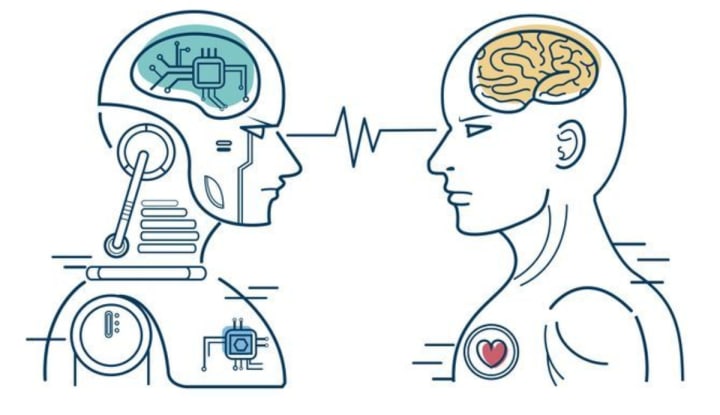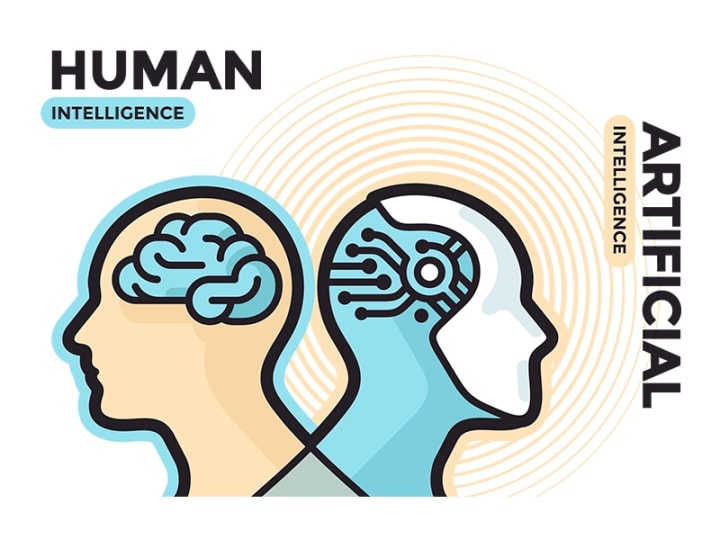Introduction:

Artificial intelligence (AI) has emerged as a topic of interest due to the rapid development of technology in the modern era. Despite the fact that artificial intelligence (AI) is a relatively new concept, it already has a lot of potential to change many aspects of life. However, concerns about how AI will affect humans and society have also been raised. We will compare and contrast the advantages and disadvantages of artificial and human intelligence in this article.
Intelligence of Humans:
Human intelligence is a person's inherent capacity for understanding, reasoning, and problem-solving. Humans are able to adapt to new situations and think critically due to their unique capacity for creativity, empathy, and emotional intelligence. Humans can improve their skills, learn from their experiences, and work together to solve difficult problems. Additionally, human intelligence enables us to comprehend social dynamics and communicate effectively with others, two essential human activities.
Machine Intelligence:
The ability of machines to learn, reason, and carry out activities that typically call for human intelligence is referred to as artificial intelligence. Algorithms are created and machines are programmed to carry out particular tasks to create AI. AI is an excellent tool for data analysis and pattern recognition because it can process large amounts of data much more quickly than humans can. AI is a valuable asset in manufacturing, transportation, and healthcare because it can work tirelessly without getting tired or making mistakes.
Comparison:
There are significant differences between AI and human intelligence, despite the fact that AI has some advantages. Unlike artificial intelligence (AI), which is limited to the tasks it is programmed to perform, human intelligence has the unique ability to learn from experience and adapt to new situations. Creativity, empathy, and emotional intelligence are other characteristics of human intelligence that are difficult for machines to duplicate. Additionally, AI lacks the ability to perceive and comprehend social dynamics, making it challenging to interact naturally with humans.
In contrast, artificial intelligence (AI) has significant advantages over human intelligence. AI is a useful tool for data analysis and pattern recognition because it can process a lot of data much faster than humans can. AI is a valuable asset in manufacturing, transportation, and healthcare because it can work tirelessly without getting tired or making mistakes.
Impact:
The application of AI has significant societal implications. AI has the potential to be beneficial, but it also has the potential to replace human jobs, which could have a significant economic impact. In the field of autonomous weapons, for example, AI can also be used to make decisions that could have a significant impact on human lives. Because AI has the potential to collect and analyze vast amounts of data, its use also raises privacy and security concerns.
Conclusion:
In conclusion, there are significant differences between human intelligence and artificial intelligence, and each has advantages and disadvantages. AI has the potential to change many aspects of life, but there are also concerns about how it will affect society. It is essential to take into account the impact that AI will have on society as we develop it and to ensure that it is utilized in a responsible and ethical manner.

Highlights of this Article:-
- The article discusses the differences between human intelligence and artificial intelligence.
- Human intelligence is the natural ability of human beings to learn, reason, and solve problems.
- Artificial intelligence refers to the ability of machines to learn, reason, and perform tasks that usually require human intelligence.
- Humans have a unique capacity for creativity, empathy, and emotional intelligence, which allows them to adapt to new situations and think critically.
- AI can process large amounts of data at a much faster rate than humans, making it a valuable tool for tasks such as data analysis and pattern recognition.
- AI lacks the ability to perceive and understand social dynamics, making it difficult to interact with humans in a natural way.
- AI has the potential to replace human jobs, which could have a significant impact on the economy.
- The use of AI also raises concerns about privacy and security, as AI has the potential to collect and analyze vast amounts of data.
- The article emphasizes the importance of considering the impact of AI on society and using it in a responsible and ethical manner.
- The article concludes by highlighting the need to balance the benefits of AI with its potential negative consequences.





Comments
There are no comments for this story
Be the first to respond and start the conversation.